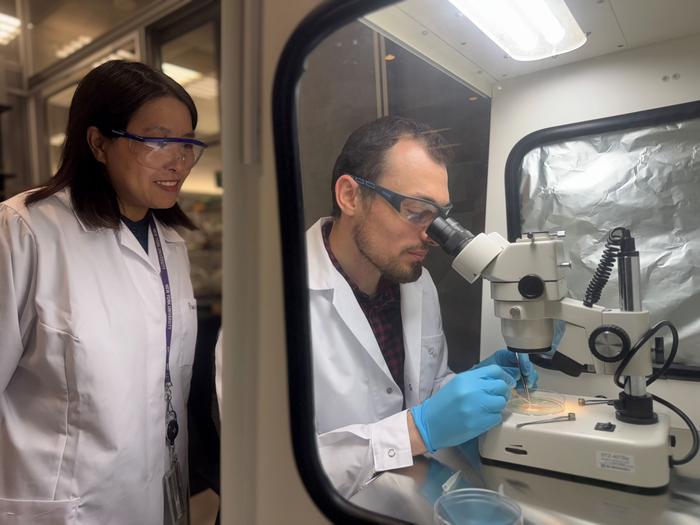
A groundbreaking research initiative at NYU Abu Dhabi has paved the way for deeper insights into neuronal development by uncovering a fundamental molecular mechanism that influences how neurons form and function. This study, conducted by the RNA-MIND Lab under the direction of esteemed Professor of Biology, Dan Ohtan Wang, and his research associate Belal Shohayeb, focuses on the role of messenger RNA (mRNA) modifications—specifically, m6A methylation. These subtle chemical marks are becoming increasingly recognized for their critical roles in the biology of neurons, particularly in regulating protein synthesis, which is vital for neural growth and connectivity.
In their recent publication in the prestigious journal Cell Reports, the researchers reveal that m6A methylation on mRNA acts as a pivotal regulatory mechanism that supports the production of essential proteins necessary for proper neuronal development. The focus of their findings is centered on a protein known as Adenomatous Polyposis Coli (APC), which is integral in maintaining the architecture of nerve cells. APC not only plays a crucial role in organizing the internal structure of neurons but is also instrumental in synthesizing β-actin, a fundamental component of the cytoskeleton that supports the growth of axons—the long projections through which neurons communicate and establish synaptic connections.
The implications of this research are significant, particularly when considering the link between these molecular processes and various neurodevelopmental disorders. Notably, the study highlights how genetic mutations associated with conditions such as autism and schizophrenia can disrupt the finely tuned processes of m6A methylation and APC production, leading to potential detriments in brain development. The researchers emphasize that such disruptions can have cascading effects on neuronal connectivity and overall brain function, underscoring the biological fragility of neuronal systems during critical periods of development.
.adsslot_nz1GNvCgoX{ width:728px !important; height:90px !important; }
@media (max-width:1199px) { .adsslot_nz1GNvCgoX{ width:468px !important; height:60px !important; } }
@media (max-width:767px) { .adsslot_nz1GNvCgoX{ width:320px !important; height:50px !important; } }
ADVERTISEMENT
Wang explicates that this convergence of global molecular processes with localized effects in neurons provides a new lens through which to view the etiology of certain psychiatric and developmental disorders. By mapping the molecular landscape that governs these processes, the research lays the groundwork for future studies that could explore therapeutic interventions aimed at mitigating the impacts of genetic disruptions on neuronal health.
The discovery that m6A methylation serves as a regulatory switch for APC expression is particularly noteworthy. This finding establishes a clear relationship between global protein synthesis and the specific needs of growing neurons. It raises fascinating questions about how localized changes in mRNA modifications can steer the complex choreography of neuronal development, emphasizing how delicate molecular mechanisms maintain the integrity of brain architecture.
As the landscape of neuroscience continues to evolve, this research contributes to a growing body of evidence pointing to the crucial interplay between genetic, molecular, and environmental factors in shaping brain function. It challenges scientists to not only consider the genetic predispositions to neurodevelopmental diseases but also to factor in the intricate web of molecular interactions that govern neuronal health and connectivity.
This research reinforces the notion that even minute alterations at the molecular level can yield significant outcomes in the macroscopic architecture and functionality of the brain. As we glean more about these processes, it becomes evident that the pursuit of understanding the underlying mechanics of the brain is monumental, especially considering the societal implications of mental health and developmental disorders.
In the domain of developmental neuroscience, the conclusions drawn from this study urge further investigation into how m6A methylation might serve as a potential therapeutic target for enhancing neuronal resilience in the face of genetic and environmental challenges. Future research initiatives could leverage this molecular insight to explore novel avenues for treatment and prevention in surgical or pharmacological landscapes.
The ramifications of this study stretch beyond pure scientific inquiry; they touch upon the broader narrative of human health and society’s collective well-being. As scientists, clinicians, and the public begin to appreciate the complexities of brain development, the relevance of this research may spark a revolution in how we approach mental health, autism, and schizophrenia—not simply as isolated genetic disorders, but as conditions that can arise from a fragile interplay of molecular, genetic, and environmental factors.
In summary, the research emerging from NYU Abu Dhabi not only elevates our understanding of neuronal development but compels us to rethink our approach to mental health and neurodevelopmental disorders. The potential for new therapeutic strategies that arise from understanding the molecular underpinnings of brain development could drastically alter the landscape of how we view and interact with brain health in the future.
As this research enters into the broader discourse of neuroscience, it highlights the importance of interdisciplinary collaboration, encouraging scientists from various fields to unite in the quest for innovative solutions. The vision articulated by Wang and his team is not merely focused on uncovering mechanisms but on fostering a comprehensive understanding that may lead to meaningful interventions that address pressing human challenges related to brain health.
In a world where scientific research increasingly informs policies and public health initiatives, establishing clear connections between fundamental science and real-world applications becomes vital. The work of the RNA-MIND Lab serves as a compelling reminder of the profound impacts that basic research can have on clinical practices, offering hope for outpacing the burdens of neurodevelopmental disorders with novel treatments that are informed by molecular understanding.
As we look forward to the implications of these findings, further research will undoubtedly continue to unravel the complexities of neuronal development. It heralds a new era of neuroscience where detailed molecular insights can guide the dialogue around brain health, catalyzing a future of informed treatments and improved outcomes for individuals affected by neurodevelopmental challenges.
The advances made by researchers at NYU Abu Dhabi are invaluable, not just within scientific circles, but also for families and communities worldwide who bear the burden of neurodevelopmental disorders. The hope is that by integrating these findings into clinical understanding, the path toward effective interventions will become clearer, ultimately serving to brighten the prospects for those affected by such conditions.
In conclusion, we stand on the precipice of a new understanding in neurobiology that respects the vast network of molecular interactions inherent in brain development. This study serves not only as a scientific breakthrough but as a clarion call for continued exploration and collaboration within the scientific community, inviting all stakeholders to engage in the profound pursuit of knowledge that holds the potential to change lives for the better.
Subject of Research: Role of m6A methylation in neuronal development and its implications for neurodevelopmental disorders
Article Title: m6A RNA methylation-mediated control of global APC expression is required for local translation of β-actin and axon development
News Publication Date: June 30, 2025
Web References: https://www.sciencedirect.com/science/article/pii/S221112472500498X
References: N/A
Image Credits: Credit: NYUAD
Keywords
Molecular neuroscience, Axon growth, Synaptic plasticity, Developmental neuroscience
Tags: Adenomatous Polyposis Coli roleaxon development and connectivitybrain development and mental healthcytoskeleton and neuronal growthm6A methylation significancemental health disorders and brain biologymolecular mechanisms in neurosciencemRNA modifications in neuronsneural architecture and functionneuronal protein synthesis regulationNYU Abu Dhabi researchRNA-MIND Lab findings


